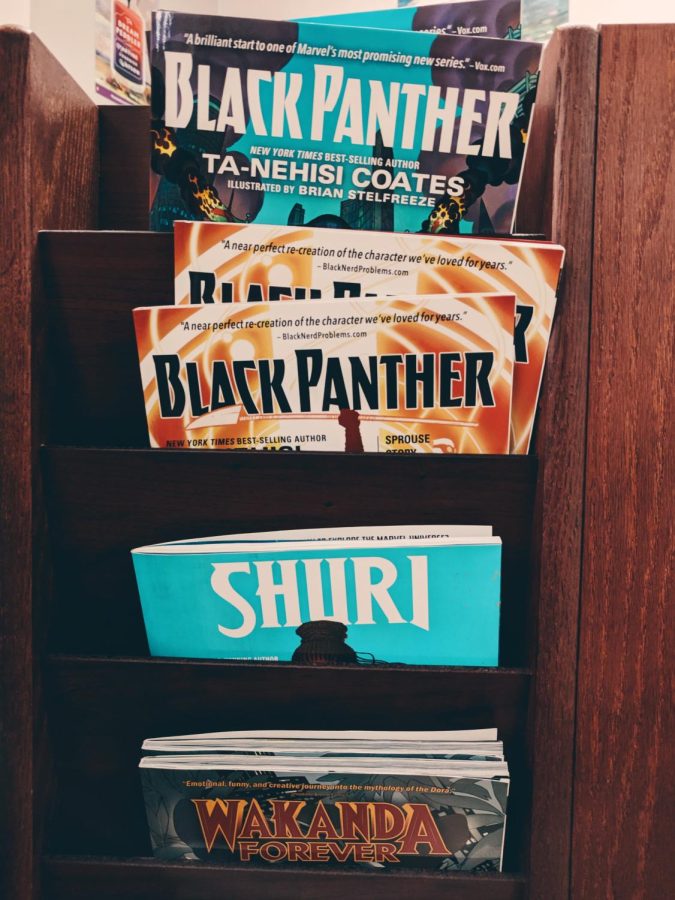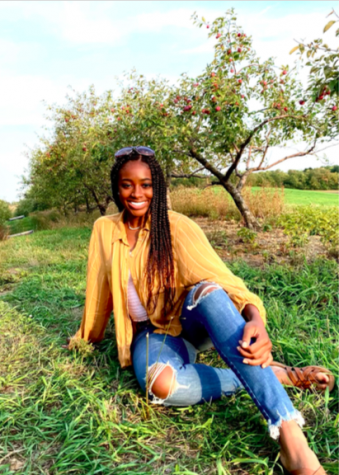Taylor’s Column: The importance of representation in American society
Campus Editor Taylor Anthony reflects on the importance of representation, especially its significance in the Black Panther film that was released in 2018.
Nov 19, 2021
While I was home during our fall break, the three-day weekend allowed me to spend time with my parents, my brothers and 8-year-old nephew. My nephew and I watched the movie “Black Panther” for maybe the tenth time, but it definitely has a greater significance since the passing of the honorable Chadwick Boseman, may he continue to rest in peace.
I have only seen a few of the other Marvel films but “Black Panther” is one of my favorites. The portrayal of a Black superhero, as Time Magazine puts it, is a “major milestone” when it comes to black representation in cinema. It is crucial for young boys and girls of all racial minority groups to be able to turn on the TV, read a novel or go to school and see or hear about a person that looks like them.
Although representation is continuing to increase, for many minority groups, it has still been significantly more difficult for people of color to see that representation within our society. Whether it be at school, in the media, in politics, or literature, American culture is supposed to reflect the diverse, multicultural American society, not a partial or misrepresented image. This has only led to the construction of negative stereotypes, underrepresentation and the deterioration of self-esteem.
As a child, being able to view someone like yourself as a role model is undeniably affirming to your self-identity. According to a study on media representation and its effects on self-esteem, “there can be an increased feeling of self-worth and pride when people are shown positive representations of themselves. Exposure to different information, including information about one’s own culture or others can cause others to feel either empowered or embarrassed.” Therefore, it can be assured that representation is undeniably affirming for one’s self-identity.
In “Black Panther,” many of the women wore Afrocentric hairstyles such as wearing their natural coiled or curly hair, braids of some sort, bantu knots and many other styles. The Black actresses such as Lupita Nyong’o and Letitia Wright are portrayals of black beauty in the Hollywood film industry.
This may have been some of the representation that I needed as a little girl — the affirmation that hair does not define our beauty. Black is always beautiful.
Growing up in a predominantly white town and attending predominantly white institutions, I would often compare myself to my white counterparts. Whether it was comparing my hair or the melanin in my skin, at a young age I couldn’t help but notice some of the physical differences between myself and others: some of my white classmates couldn’t help but make it evidently clear that there was one.
I will always be proud of where I came from and I am beyond grateful for the people I met along the way because I wouldn’t be where I am today without them. I appreciate the immense number of opportunities that I’ve had and the educators who saw attributes in me that I didn’t always see in myself. (If they read this, they know who they are.)
It wasn’t until my freshman year of college at John Carroll that I had my first professor of color. I also had the opportunity to enroll in one course that taught me specifically about the experiences of African Americans in the United States.
Think back to your required readings and teachings in your high school English and History classes. I know that I was rarely assigned to read novels by prominent Black authors such as James Baldwin, Maya Angelou or W.E.B. Du Bois, but rather George Orwell, Virginia Woolf and Ernest Hemingway.
In history classes, we only really learned about the Civil Rights era and slavery. These brief lessons that were taught made it seem like Black History, or the history of any other racial minority group, is disassociated from American History. In reality, they are all a reflection of our country’s history; it should be taught that way.
Now let me be clear, I am not saying that I would have preferred the teachings of Black authors over White authors and I am not dismissing the work of the remarkable White authors I have read. I am also not saying that I only wanted to learn about Black History. What I am saying is that I would have liked for my curriculum to be less Eurocentric by seeing more overall representation throughout my education.
As I have grown into the young Black woman I am today, the lack of representation in many aspects of our society from education and literature to media and politics has become blatantly more apparent to me. We live in an increasingly diverse country and that diversity needs to continue to be appreciated and acknowledged. We must continue to inspire the minority youth of today. We must allow them to see their identity reflected in American culture. We must continue to create a society in which representation matters.
The “Black Panther” movie is a symbol of Black excellence and pride. It inspired a generation of young Black boys and girls all over the world. A celebration of cultural representation. Wakanda Forever.













